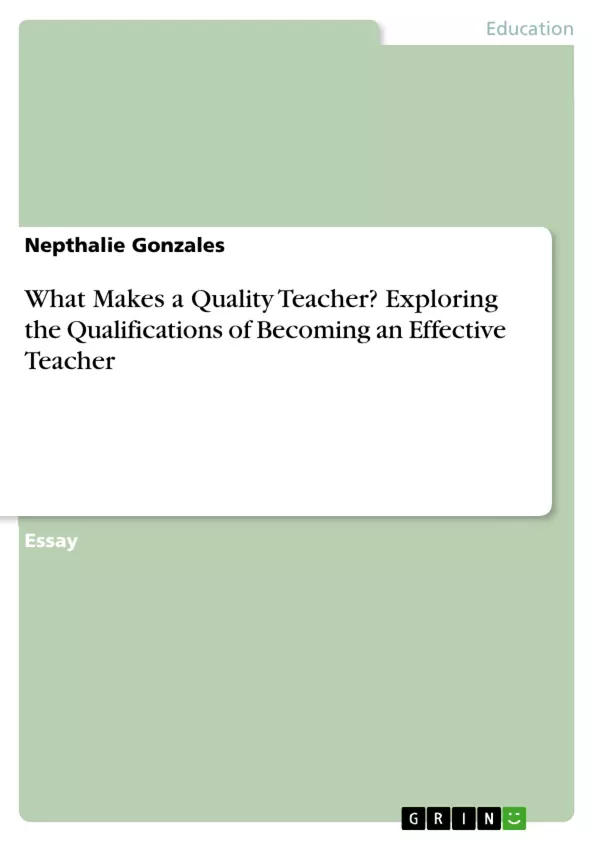This paper explores the fight for quality education, teachers' qualifications and how to measure a teacher's effectiveness.
The quality of an education system depends on the quality of their teachers, and the quality teachers depend on the quality of teacher policies. Teacher policies are the regulations and principles of action of the school and education system that shape the
teaching force and what teachers do. The education system provides various strategies to equip the teachers to be more capable in their work environment.
For more than a decade in the Department of Education, I have seen distinct stories and struggles of teachers to reach the learner's attention and capture their hearts. Teachers provide many opportunities to the learners as well as many experiences that the learners may need in the future. Thus, the teacher opts for various ways to become more effective for their learners.
The measurement for the effectiveness of a teacher is by student achievement, and achievement increases as standardized test scores of students also increase. The effective teacher touches the heart of their learners; they can make a deep difference in the lives of their learners.
Table of Contents
- The Quality of an Education System
- Becoming More Effective for Learners
- Specialization and Student Achievement
- The Role of Education Background
- Teacher Certification and Licensure
Objectives and Key Themes
The primary goal of this text is to explore the qualifications that contribute to becoming an effective teacher, focusing on factors that influence teacher quality and student achievement. The discussion draws on research and findings from various sources, including the OECD, National Council on Teacher Quality, and studies on the effectiveness of specialized teachers.
- The impact of teacher specialization on student achievement
- The role of education background, including master's degrees and college selectivity, in teacher effectiveness
- The influence of teacher certification, both traditional and alternative, on pedagogical and content knowledge
- The relationship between teacher qualifications and student outcomes
- The challenges of ensuring quality and effectiveness in teacher training and development
Chapter Summaries
- The Quality of an Education System: This section introduces the central argument that the quality of an education system is directly linked to the quality of its teachers and the policies governing teacher development. It highlights the importance of providing teachers with the necessary tools and support to be effective in their roles.
- Becoming More Effective for Learners: This section examines the various approaches teachers employ to become more effective, including engaging teaching styles, diverse learning experiences, and the pursuit of higher education. It emphasizes the idea that effective teachers connect with students on a personal level and inspire learning.
- Specialization and Student Achievement: This section delves into the relationship between teacher specialization and student outcomes. Research findings suggest that teachers who specialize in their subject areas are better equipped to deliver in-depth knowledge and achieve stronger student results. It also addresses the potential challenges of out-of-field teaching.
- The Role of Education Background: This section explores the significance of education background in teacher effectiveness. It examines the influence of college selectivity, specific education courses, and the acquisition of master's degrees. It also acknowledges the varying opinions and research findings regarding the impact of advanced degrees on teacher performance and student achievement.
- Teacher Certification and Licensure: This section focuses on the role of certification and licensure in ensuring teacher quality. It discusses traditional certification processes, alternative routes to certification, and the significance of national board certification for teachers. It highlights the diverse pathways to becoming a teacher and the evolving requirements in the field.
Keywords
The text centers around key terms and concepts including teacher effectiveness, student achievement, teacher specialization, education background, teacher certification, alternative certification, teacher policies, pedagogical content knowledge, and the quality of education systems. These keywords represent the core focus of the work, highlighting the importance of qualifications and preparation in shaping the success of educators and learners.
Frequently Asked Questions
How is teacher effectiveness measured?
Effectiveness is often measured by student achievement, particularly through increases in standardized test scores and the overall impact on learners' lives.
Does teacher specialization improve student outcomes?
Research suggests that teachers who specialize in their subject areas are better equipped to deliver in-depth knowledge and achieve stronger results.
What role does a teacher's education background play?
While advanced degrees (like Master's) are common, their direct impact on teacher performance is a subject of ongoing debate in educational research.
What is the difference between traditional and alternative certification?
Traditional certification follows a standard university path, while alternative routes allow professionals from other fields to enter teaching through accelerated programs.
Why are teacher policies important for education quality?
Teacher policies shape the teaching force and determine the strategies used to equip teachers with the necessary tools for their work environment.
- Quote paper
- Nepthalie Gonzales (Author), 2020, What Makes a Quality Teacher? Exploring the Qualifications of Becoming an Effective Teacher, Munich, GRIN Verlag, https://www.grin.com/document/540489



